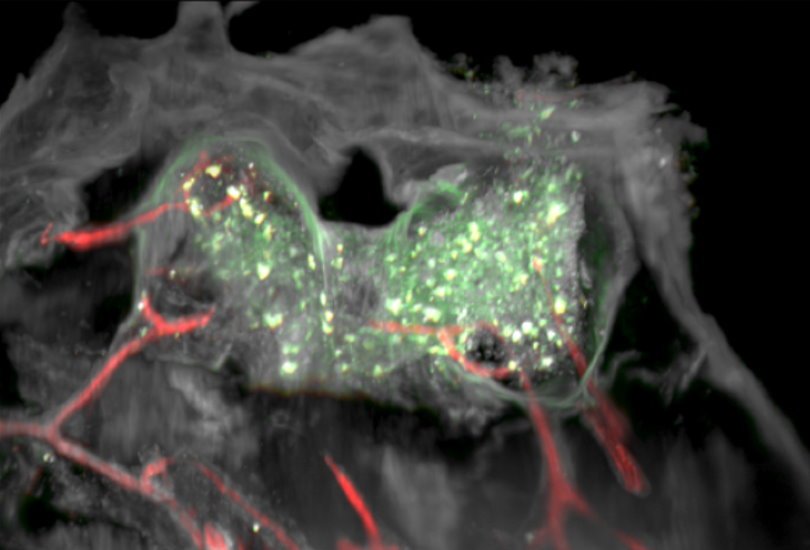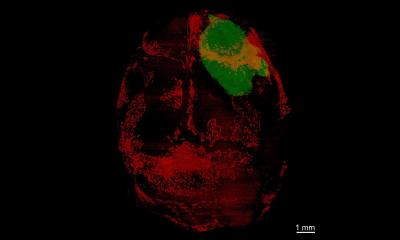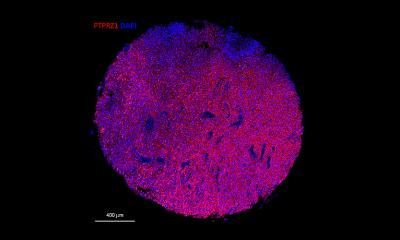
© Dobersalske/Scheffler / DKTK
News • Brain cancer research
Glioblastoma: Surprising find of immune cells
Glioblastomas are highly aggressive, usually incurable brain tumours. If all therapeutic options are exhausted, patients have an average life expectancy of less than two years.
Now, researchers from the German Cancer Consortium (DKTK) at the West German Tumor Center Essen have made a surprising discovery: in the vicinity of glioblastomas, they found islands of highly potent immune cells in the neighboring bone marrow of the skull, which play a central role in defending against cancer. The new data may open up prospects for innovative therapies. On the other hand, they cast a shadow over conventional strategies.
The researchers published their findings in the journal Nature Medicine.
“What we have found is surprising and fundamentally new,” says Björn Scheffler, DKTK researcher at the Essen site. Until now, the body's own defenses have always been thought of as a holistic system that sends its troops to different parts of the body as required. “However,” says Scheffler, “our data show that highly potent immune cells gather in regional bone marrow niches close to the tumour and organize the defence from there. At least this is the case with glioblastomas."
When we opened the skull, we may have destroyed important immune cells in the process. [...] We are thinking about how we can minimize damage to the local bone marrow in the future
Ulrich Sure
Based on new findings from animal experiments, the Essen team took tissue samples from the bone marrow near the tumour in the skull from untreated patients with glioblastoma. “However, the methods for this first had to be established,” reports first author Celia Dobersalske, emphasizing the fact that the new research results were obtained from human tissue samples.
The researchers hit the bull's eye in their search: Bone marrow niches in close proximity to the glioblastoma appear to be the reservoir from which the anti-tumour defense is recruited. Apart from active lymphoid stem cells that develop into immune cells, the researchers also found mature cytotoxic T lymphocytes (CD8 cells) in the bone marrow close to the tumour. “These are highly effective immune cells that play a central role in the defense against cancer,” adds Celia Dobersalske. They can recognize and destroy malignant cells.
The CD8 cells in the bone marrow near the tumour had an increased number of receptors on their surface, which control the proliferation of mature T lymphocytes. In line with this, descendants of the same cell clones - one clone originates from one and the same cell - were detected both in the bone marrow and in the tumour tissue. This is clear evidence that the immune cells gathered on site are fighting the glioblastoma. “And they are successful - at least for a while,” says Björn Scheffler. “We were able to show that the course of the disease correlates with the activity of the local CD8 cells.”
This finding not only turns conventional ideas about how the immune system works on their head. The treatment concepts for glioblastoma must also be reconsidered in light of the new data. "Until now, we hadn't even included the skullcap in our considerations. How could we, since there was no evidence that highly potent immune cells could be hiding there,” says senior author Scheffler.
“When we opened the skull, we may have destroyed important immune cells in the process,” confirms Ulrich Sure, Director of the Department of Neurosurgery and member of the Essen research team. "In view of the new findings, we find ourselves in a dilemma: we have to gain access to the tumour in order to remove it and also to be able to confirm the diagnosis. There is currently no other way than through the skull. But we are thinking about how we can minimize damage to the local bone marrow in the future."
On the other hand, the discovery of the local immune system opens up opportunities for innovative therapies. In particular, so-called checkpoint inhibitors are coming back into play. These are immunotherapeutic agents that aim to boost the body's own cancer defenses. However, checkpoint inhibitors tested to date have shown little effect on glioblastomas. “Various explanations have been suggested, but perhaps we also need to rethink things in this respect,” says Björn Scheffler. "We now know that highly potent immune cells are indeed present on site. We were able to prove that they are fit to fight tumours, but they are not capable of destroying the tumour on their own. This is where we can start. One challenge will be to deliver drugs in sufficient concentration to the regional bone marrow niches at the right time. If we succeed, we may have a chance of controlling the growth of glioblastomas and improving our patients' chances of survival."
This work was funded by the Wilhelm Sander Foundation and the DKTK Joint Funding Program 'HematoTrac'.
Source: German Cancer Research Center
01.08.2024











